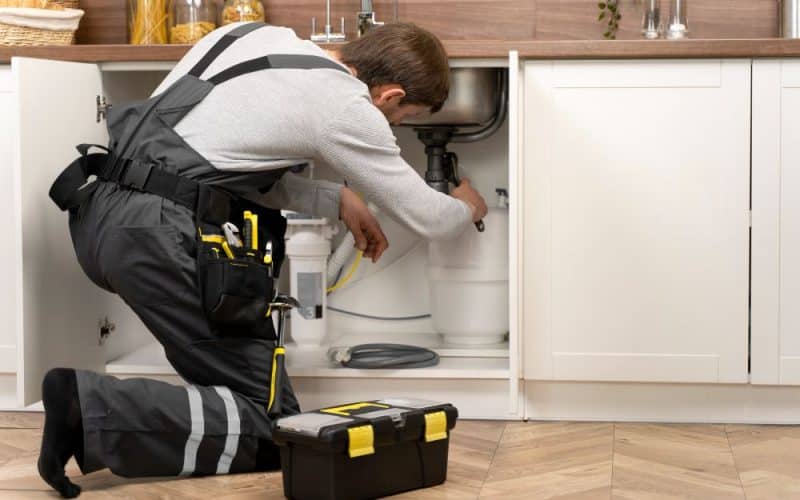A plumber, also known as a plumbing maintenance technician, is a skilled tradesperson in charge of installing, inspecting and repairing pipes and plumbing systems to make sure all of a building’s fixtures operate correctly. Their duties include finding the source of leaks and blockages, fixing or replacing broken parts and testing the plumbing system.
They also collaborate with other construction professionals such as general contractors to ensure everything goes according to plan during renovations or new builds.
While plumbers already make a decent amount of money, there are always ways to make more and increase their salary. Some methods require more work than others, but they all include going above and beyond the call of duty.
What does a plumber do?
Plumbers play a vital role in maintaining the functionality and efficiency of plumbing systems, contributing to the comfort and well-being of individuals and communities. They specialize in the installation, repair, and maintenance of plumbing systems. Plumbing systems consist of pipes, fixtures, and appliances that facilitate the distribution of water, gas, and waste disposal in residential, commercial, and industrial settings.
Plumbers are responsible for ensuring the proper functioning and efficiency of these systems. This allows for a clean water supply, effective drainage, and the overall health and safety of occupants.
Plumbers also perform a wide range of tasks, including installing and connecting pipes, fixtures, and appliances such as sinks, toilets, showers, water heaters, and irrigation systems. They interpret blueprints and building codes to plan and execute plumbing installations. Plumbers also diagnose and troubleshoot issues such as leaks, clogs, or malfunctioning components, using specialized tools and techniques to identify and repair problems.
Additionally, they may collaborate with other professionals, such as architects and construction teams, to ensure plumbing systems are integrated seamlessly into building projects and meet the required standards and regulations.
Plumber duties and responsibilities
The duties and responsibilities of plumbers may vary depending on the job, but some common tasks include:
- Installation of Plumbing Systems. Plumbers install new plumbing systems, including piping, fixtures, and appliances such as sinks, toilets, and water heaters. They follow building codes and blueprints to ensure proper placement and connection of components. Plumbers may also install irrigation and sprinkler systems.
- Maintenance and Repair of Plumbing Systems. Plumbers maintain and repair existing plumbing systems, including diagnosing issues such as leaks, clogs, and damaged components. They use specialized tools such as augers, snakes, and hydro jets to unclog drains and pipes. They also replace and repair damaged pipes and fixtures, and troubleshoot issues such as low water pressure or temperature fluctuations.
- Emergency Services. Plumbers may provide emergency plumbing services 24/7. This may involve responding to urgent calls to fix burst pipes, clogged drains, or other plumbing emergencies that require immediate attention.
- Installation and Maintenance of Gas Lines. Plumbers install and maintain gas lines in residential, commercial, and industrial settings. They ensure proper installation and connection of gas lines and appliances such as stoves, ovens, and water heaters. They also perform gas leak detection and repair.
- Collaboration with Other Professionals. Plumbers often collaborate with other professionals, such as construction teams, architects, and engineers. They ensure that plumbing systems are integrated seamlessly into building projects and that all necessary regulations and standards are met.
- Customer Service. Plumbers communicate with clients to understand their plumbing needs and concerns. They provide advice and recommendations on plumbing solutions and may provide cost estimates for plumbing projects. They also ensure that customers are satisfied with their work and address any issues that arise.
- Interpretation of Building Codes and Regulations. Plumbers must be knowledgeable about building codes and regulations related to plumbing systems. They interpret blueprints and plans to ensure compliance with local, state, and federal codes and regulations. They also obtain necessary permits and inspections for plumbing projects.
Types of plumbers
There are several types of plumbers, each specializing in different areas of plumbing. Here are some common types of plumbers and a brief overview of what they do:
Residential plumbers
Residential plumbers focus on plumbing systems in homes, apartments, and other residential properties. They handle a wide range of tasks, including installing and repairing plumbing fixtures, such as sinks, toilets, showers, and water heaters. Residential plumbers also work on water supply lines, drainage systems, and sewage lines within residential buildings.
Service and repair plumbers
Service and repair plumbers focus on diagnosing and fixing plumbing issues. They respond to service calls from residential, commercial, or industrial clients to address plumbing emergencies, such as leaks, clogs, or broken fixtures. Service and repair plumbers utilize their problem-solving skills and knowledge to troubleshoot issues and perform necessary repairs to restore proper plumbing functionality.
Commercial plumbers
Commercial plumbers specialize in plumbing systems for commercial buildings, such as offices, retail stores, restaurants, and schools. They handle larger-scale projects that require extensive knowledge of commercial plumbing codes and regulations. Commercial plumbers may work on installing and maintaining complex plumbing systems, including water supply and drainage systems, fire sprinkler systems, and large-scale water heaters.
Construction plumbers
Construction plumbers work on new construction projects. They collaborate with architects, builders, and other construction professionals to install plumbing systems in new buildings. Construction plumbers read blueprints, lay out the piping systems, and install fixtures and appliances according to specifications and building codes.
They also ensure that plumbing systems are integrated into the overall construction process seamlessly.
Industrial plumbers
Industrial plumbers work in industrial settings, such as factories, manufacturing plants, and power plants. They handle specialized plumbing systems and equipment unique to industrial environments. Industrial plumbers may be involved in installing and maintaining large-scale piping systems, boilers, cooling systems, and other industrial plumbing equipment.
Green plumbers
Green plumbers specialize in environmentally friendly plumbing practices. They focus on water conservation, energy efficiency, and sustainable plumbing solutions. Green plumbers may recommend and install fixtures such as low-flow toilets, water-saving faucets, and rainwater harvesting systems.
They also provide guidance on eco-friendly practices to clients.
Plumbers salary
Currently, the average hourly salary for an entry-level plumber in the United States is $30.39 an hour, according to ZipRecruiter.
While there are hourly wages as high as $48.08 and as low as $14.18, the majority of plumber salaries currently range between $23.80 (25th percentile) to $34.86 (75th percentile) across the United States. The average salary range for a plumber varies greatly (by as much as $11.06), which suggests there may be many opportunities for advancement and increased pay based on skill level, location and years of experience.
Below is a salary breakdown for plumbers by state:
| State | Annual Salary | Monthly Pay | Weekly Pay | Hourly Wage |
|---|---|---|---|---|
| Oregon | $71,663 | $5,971 | $1,378 | $34.45 |
| Alaska | $71,436 | $5,953 | $1,373 | $34.34 |
| North Dakota | $71,330 | $5,944 | $1,371 | $34.29 |
| Massachusetts | $70,713 | $5,892 | $1,359 | $34.00 |
| Hawaii | $69,839 | $5,819 | $1,343 | $33.58 |
| Washington | $68,826 | $5,735 | $1,323 | $33.09 |
| Nevada | $67,543 | $5,628 | $1,298 | $32.47 |
| South Dakota | $67,414 | $5,617 | $1,296 | $32.41 |
| Colorado | $66,891 | $5,574 | $1,286 | $32.16 |
| Rhode Island | $66,377 | $5,531 | $1,276 | $31.91 |
| Mississippi | $64,771 | $5,397 | $1,245 | $31.14 |
| New York | $64,056 | $5,338 | $1,231 | $30.80 |
| Delaware | $62,943 | $5,245 | $1,210 | $30.26 |
| Vermont | $62,526 | $5,210 | $1,202 | $30.06 |
| Virginia | $62,057 | $5,171 | $1,193 | $29.84 |
| Illinois | $61,927 | $5,160 | $1,190 | $29.77 |
| Maryland | $60,963 | $5,080 | $1,172 | $29.31 |
| Kansas | $60,941 | $5,078 | $1,171 | $29.30 |
| Nebraska | $59,681 | $4,973 | $1,147 | $28.69 |
| California | $59,358 | $4,946 | $1,141 | $28.54 |
| Missouri | $59,263 | $4,938 | $1,139 | $28.49 |
| South Carolina | $58,742 | $4,895 | $1,129 | $28.24 |
| Pennsylvania | $58,681 | $4,890 | $1,128 | $28.21 |
| New Jersey | $58,636 | $4,886 | $1,127 | $28.19 |
| Wisconsin | $58,089 | $4,840 | $1,117 | $27.93 |
| Maine | $57,993 | $4,832 | $1,115 | $27.88 |
| Oklahoma | $57,796 | $4,816 | $1,111 | $27.79 |
| North Carolina | $57,529 | $4,794 | $1,106 | $27.66 |
| New Hampshire | $57,054 | $4,754 | $1,097 | $27.43 |
| Idaho | $56,766 | $4,730 | $1,091 | $27.29 |
| Texas | $56,370 | $4,697 | $1,084 | $27.10 |
| Wyoming | $56,169 | $4,680 | $1,080 | $27.00 |
| Minnesota | $56,128 | $4,677 | $1,079 | $26.99 |
| Kentucky | $55,885 | $4,657 | $1,074 | $26.87 |
| New Mexico | $55,788 | $4,649 | $1,072 | $26.82 |
| Indiana | $55,443 | $4,620 | $1,066 | $26.66 |
| Michigan | $55,381 | $4,615 | $1,065 | $26.63 |
| Ohio | $54,552 | $4,546 | $1,049 | $26.23 |
| Arizona | $54,296 | $4,524 | $1,044 | $26.10 |
| Connecticut | $54,141 | $4,511 | $1,041 | $26.03 |
| Iowa | $53,673 | $4,472 | $1,032 | $25.80 |
| Montana | $53,478 | $4,456 | $1,028 | $25.71 |
| Arkansas | $52,843 | $4,403 | $1,016 | $25.41 |
| Alabama | $52,810 | $4,400 | $1,015 | $25.39 |
| Utah | $52,129 | $4,344 | $1,002 | $25.06 |
| Tennessee | $52,080 | $4,340 | $1,001 | $25.04 |
| Georgia | $49,197 | $4,099 | $946 | $23.65 |
| Louisiana | $49,005 | $4,083 | $942 | $23.56 |
| West Virginia | $45,320 | $3,776 | $871 | $21.79 |
| Florida | $43,539 | $3,628 | $837 | $20.93 |
How to increase your salary as a plumber
While plumbers already make a decent amount of money, there are always ways to make more. Some methods require more work than others, but they all include putting in more hard work and effort.
Plumbing certifications
Certifications that apply to your job are one of the best ways to make yourself a more valuable worker. Not only do certifications show that you’re qualified to do the job at hand, but they also show that you’re making an investment of time and money towards becoming a better plumber.
You can learn about some of the most popular plumbing certifications here.
Take more training
In the same way that getting certifications could increase your salary, additional training can do the same thing.
You can receive on-the-job training by shadowing more experienced workers, or you can get classroom training at your local tech/trade school. Either way, you’re sure to increase your value and, therefore, your salary.
Stay ahead of the curve
The plumbing industry is constantly changing. Every year, new tools, methods, and technology emerge. Many of these tools and methods are meant to make your job easier and to make you a more efficient worker.
By staying on top of plumbing trends and being up to date on the latest innovations, you will be a valuable asset to any company.
Improve skills outside of your daily work
Being a good plumber or electrician is the most important aspect of your job. However, by improving yourself in other skills about your job, you can make yourself even more valuable.
Two of the best places to start are your sales skills and your management skills. There are plenty of online tools available to help you improve in these areas.
Go the extra mile
It might go without saying, but going the extra mile is one of the biggest things that employers look at when promotion time comes around. If you’re a hard worker who gives their all and betters themselves with any of the methods on this list, you’re going the extra mile.
For example, if the boss needs someone to work unexpectedly, you could step up and help out. See someone struggling with how to do something? Go out of your way to teach them.
Move up the ladder or start your own company
The two quickest ways to make more money as a plumber are by getting a promotion or starting your own company. While both of these things are difficult, they’re more than possible. For example, you’ll give yourself a great shot at a promotion by doing one or more of the things on this list.
Starting your own company, while being the fastest way to increase your salary, is a huge career step. It’s also one of the most difficult things you’ll ever do. To have a successful company, you’ll have to do every single thing on this list and more.
Certifications, training, maintaining industry standards, and gaining tons of new skills are par for the course when you own your own plumbing business.
Recommended Articles
- Flight Attendant Salary: How Much Do Flight Attendants Make in 2024?
- Budget Analyst Salary: How Much Do Budget Analysts Make in 2024?
- Career vs Job: What’s The Difference & Which Should You Have?
- How to Become a Notary in Texas: The Complete Guide
- Automotive Engineer Salary: 2024 Salary Guide
- Anthropologist Salary: How Much Do Anthropologists Make In 2024?






